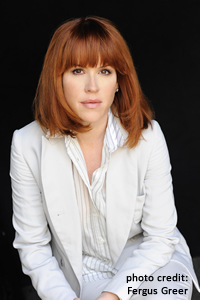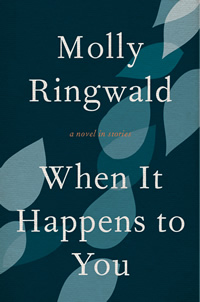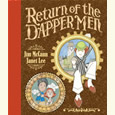Pretty in Prose
Actor and teen star Molly Ringwald talks with Chapter 16 about reinventing herself as a novelist
Molly Ringwald, whom Michael Agger, writing in New York Magazine in 2005, called “the girl in everyone’s yearbook, the actress we think about when we think about our youth,” has many strings to her bow. Long before director John Hughes cast the then-teenaged Ringwald as the star of Sixteen Candles, she was a singer with a jazz album (I Wanna Be Loved By You, recorded with her father’s band when she was six) under her belt. Now Ringwald, forty-four, has written When It Happens to You, a novel composed of eight linked stories that The Guardian called “a deft exploration of the human capacity to rediscover oneself when faced with betrayal.”
Readers who came of age when Ringwald’s star blazed brightly will search in vain for personal revelation: though the stories unfold in a milieu that glancingly resembles facets of Ringwald’s own life (the setting is Southern California, where Ringwald currently lives; one subplot involves an actor), When It Happens To You is a feat of imagination. It’s not even memoir dressed up as fiction. “The Harvest Moon,” the first story in the collection, is written from the point of view of a married woman roughly Ringwald’s age, but the following story (“Redbud”) is narrated by the first character’s mother. Two stories later, the protagonist is a man. Sometimes, the change in perspective is unsettling; just as you’re getting absorbed in a narrative, Ringwald abandons that particular thread. By the end of the novel, though, it’s the unresolved storylines that continue to haunt, managing both to satisfy and to leave the reader wanting more. Ringwald recently answered questions from Chapter 16 via email:
Chapter 16: When It Happens To You is a collection of stories linked in unexpected ways. It’s a narrative garden of forking paths, in which a minor or peripheral character from one story emerges as the protagonist of the next. Did the shape of the book reveal itself to you over time, as you wrote? Or did you plan the whole thing before you started?
 Ringwald: I had originally planned to write a collection of stories along the theme of “betrayal” and I thought that the stories would be connected in a much less profound way. But pretty soon (in fact, as soon as I was almost done with the first story) I realized that I wanted to focus on a much smaller cast of characters.
Ringwald: I had originally planned to write a collection of stories along the theme of “betrayal” and I thought that the stories would be connected in a much less profound way. But pretty soon (in fact, as soon as I was almost done with the first story) I realized that I wanted to focus on a much smaller cast of characters.
Chapter 16: Your narrators are old, young, male, female, married, single—in short, almost as diverse as it gets. Is inhabiting these characters at all reminiscent of acting? Do you practice a kind of method writing, the better to project yourself inside a person whose perspective differs so fundamentally from your own?
Ringwald: I don’t practice “method acting,” which from my understanding involves “becoming” the characters to a certain extent in your daily life. I have always tried to keep the two very separate. For instance, if playing a drug addict, I would not feel the need to partake just to know what it feels like. I would however try to find people to explain what it feels like to them and substitute a similar feeling from my own life that feels comparable. Additionally, my imagination and powers of observation have helped me immeasurably in both my acting and in my writing.
Chapter 16: In Faulkner’s The Sound and the Fury, four narrators share the story, each providing his or her own take on the Compson family. Yet Caddy, arguably the book’s central character, only appears through others’ eyes. You practice a similar sleight of hand, in which the Other Woman—Theresa—is described only from other characters’ perspectives. Did you consciously choose to omit her point of view?
Ringwald: Yes. I thought about including her point of view, but I felt that her story was not really integral to the main plot. I do think that she could be an interesting character, but I feel like she would need her own book. To put her point of view in this one would have made it a little bit too “Rashomon.” I liked having that bit of mystery and space—like the empty part of the canvas that allows the viewer (or, in this case, the reader) some breathing room.
Chapter 16: You avoid sentimentalizing the relationship between parents and children, exploring time and again the ways family members vex, annoy, misunderstand, and even betray one another. In your stories, love between parents and children is not automatic or instinctive, or even to be taken for granted. It seems, instead, as fraught and passionate as a romantic partnership. Is this an accurate reading?
 Ringwald: For me, what was interesting was to show different points of view on parenting. There are so many clichés about how one is meant to feel toward one’s children, but this doesn’t take into account the true range of individual experiences. Greta, Marina, and Betty are all mothers who have vastly different experiences and conflicting feelings regarding what it means to be a mother. Greta is the character who defines herself first and foremost as a wife and mother; Marina (mother of Oliver/Olivia) never wanted to be a mother and then finds herself passionately engaged in parenting a complicated child; and Betty, by her own admission, was a terrible mother who is now experiencing regret toward the end of her life as she finds herself feeling maternal for a child (Charlotte) who is not even related to her.
Ringwald: For me, what was interesting was to show different points of view on parenting. There are so many clichés about how one is meant to feel toward one’s children, but this doesn’t take into account the true range of individual experiences. Greta, Marina, and Betty are all mothers who have vastly different experiences and conflicting feelings regarding what it means to be a mother. Greta is the character who defines herself first and foremost as a wife and mother; Marina (mother of Oliver/Olivia) never wanted to be a mother and then finds herself passionately engaged in parenting a complicated child; and Betty, by her own admission, was a terrible mother who is now experiencing regret toward the end of her life as she finds herself feeling maternal for a child (Charlotte) who is not even related to her.
Chapter 16: Greta and Phillip’s marriage is the central narrative of the book. The title story seems to suggest that forgiveness and reconciliation are impossible; yet in the book’s final lines, estranged husband and wife stand together, watching from the ground as their daughter, strapped into a carnival ride, takes to the sky. It’s a lovely image, one that perfectly captures the ways in which parents who divorce are always, irrevocably, joined by their children. Or do you imagine a different future for Greta and Phillip, one in which they are able to reunite?
Ringwald: I did not mean to suggest in any way that forgiveness is impossible. In fact, quite the opposite. I feel that forgiveness is the only way out of the kind of hell that the characters have found themselves in. I just don’t think that it is easy, and I don’t believe that relationships can ever go back to the way they were before. But perhaps this is a good thing. As Phillip says to his brother in “Mea Culpa,” as much as he wants his wife back, he knows that there was something wrong, or not right, with their relationship. I feel that Greta and Phillip are probably in the first stage of reconciliation. She has at least opened the door a crack, but whether or not they make it is an open question. As an optimist, I like to believe that they do.
Chapter 16: The story “Ursa Minor” begins, “For the greater part of his twenties and half of his thirties, Peter Layton’s longest-standing relationship was with a young male polar bear named Pooka.” Pooka turns out to be an animated character, and Peter’s career is a gentle poke at Hollywood; one imagines you could have taken the satire much, much further. Are you ever tempted to do so?
Ringwald: I didn’t set out to write a satire of Hollywood as much I wanted to write about a man’s artistic betrayal. Peter is a Yale-trained theater actor who has a great deal of talent and knowledge of the theater and who somehow finds himself stuck in a children’s television show for fifteen years. He is not unlike the main character of Phillip in that they have both betrayed themselves to the point where they no longer recognize who they are. Peter does it through remaining in a show that kills his soul, Phillip through betraying the woman he loves and his family.
Chapter 16: Are you writing another book—a novel, a collection of stories, or something else entirely?
Ringwald: I am thinking seriously of adapting WIHTY for film, and I am also in the very beginning process of writing another novel.
Molly Ringwald will discuss When It Happens To You at the Nashville Public Library on September 18 at 6:15 p.m. as part of the Salon@615 series. The event is free and open to the public.





